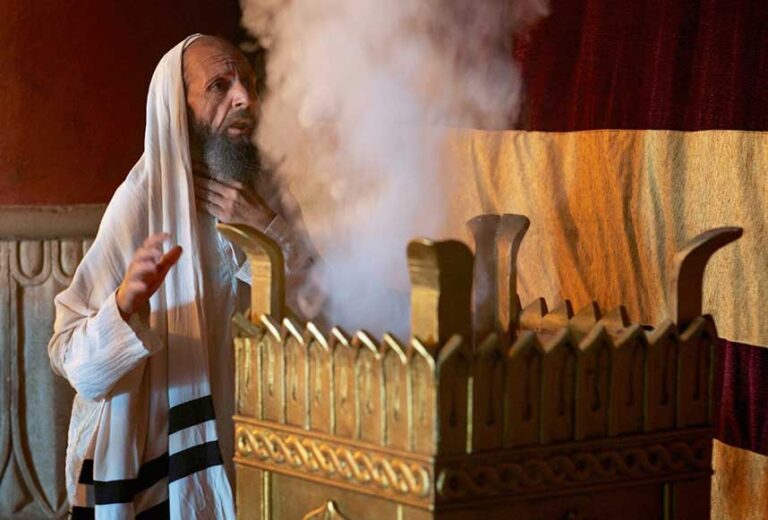
All rights reserved.
By Sheila Klassen-Wiebe
Luke 1:5–25, 57–80
Priests like Zechariah were called upon to serve in the temple for two weeklong periods every year. During the particular term of service described in our text today, Zechariah’s name is drawn by lot to perform the special task of burning incense in the holy place, a space second in holiness only to the Holy of Holies. In this sacred space, an angel visits Zechariah with news that his wife, Elizabeth, will bear a son, and that he should name the boy John, meaning “Yahweh has shown favor.” This announcement is an answer to Zechariah’s prayer for a son and the people’s prayer for redemption.
The angel’s words outline the role John will have in God’s saving purposes. The command to abstain from alcohol signals consecration for a divine task. Like God’s agents in the past, John will be filled with the Holy Spirit. His vocation will be to prepare people for the Lord’s coming by calling Israel back to God, thereby fulfilling expectations for Elijah’s return on the last day.
Here the language of turning is used in verses 16 and 17. Later we learn that John will carry out his mission by preaching repentance for the forgiveness of sins. In response to Zechariah’s incredulity, the angel identifies himself as Gabriel, the revealer of divine mysteries (see Daniel 8–9), who comes from the very presence of God. As a sign to Zechariah that his words are true and as reproof of Zechariah’s unbelief, Gabriel pronounces that Zechariah will be mute until the events have come to pass.
Luke mentions John’s birth briefly, focusing instead on his circumcision and naming. The theme of joy, so prominent throughout Luke’s narrative, reappears here. Zechariah’s naming of the child in accordance with Gabriel’s command acknowledges his acceptance of the divine message, and he regains his speech and praises God.
The crowd’s wondering question, “What then will this child become?” (1:66) anticipates John’s divinely given commission and leads into Zechariah’s song. The Benedictus (1:68–79) reiterates previous themes and introduces others that are equally pivotal in the Gospel of Luke. The first part of the hymn praises God for great acts of deliverance in the past. It highlights God’s restoration of David’s kingdom and the fulfillment of God’s promises to Abraham.
The language of salvation is prominent here, envisioning a time of freedom from enemies and freedom to serve God without fear. In the second part of the hymn, Zechariah addresses John directly and looks to the future. He echoes Gabriel’s message that the child will prepare the way for the Lord, anticipating the coming of God’s Messiah. The themes of peace and light, which appear as salvation language elsewhere in Luke and Acts, conclude this hymn of praise.
—
Where do you need to be silent today, like Zechariah before John’s birth, and marvel at what God is doing in your life?
Where do you need to burst into song, and share good news with anyone who will listen? God, quiet my voice when needed so I can become more aware of where you are at work in and around me. Amen.
—
This Bible study comes from Shine: Living in God’s Light, the Sunday school curriculum published by Brethren Press and MennoMedia. It was also featured in Messenger magazine. Support the ministry of Communications of the Church of the Brethren today at www.brethren.org/give.
(Read this issue of eBrethren.)

